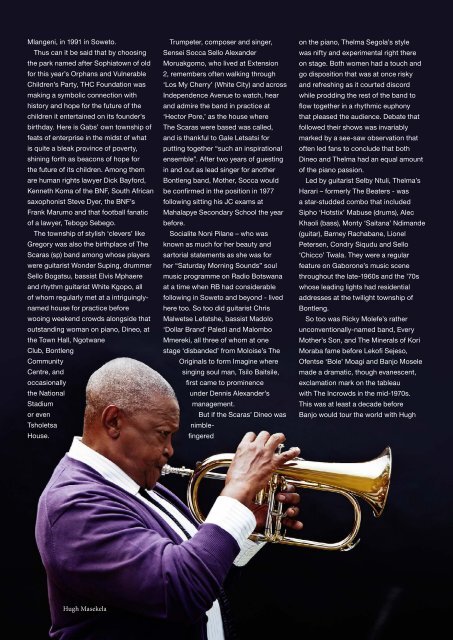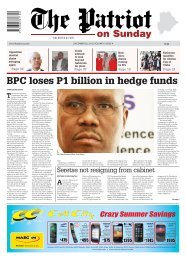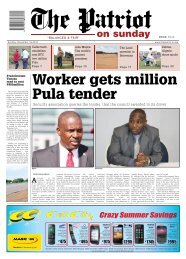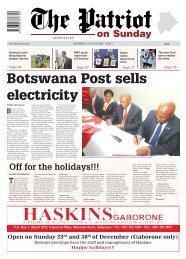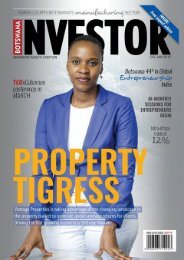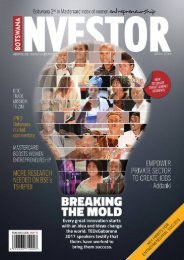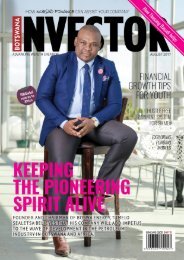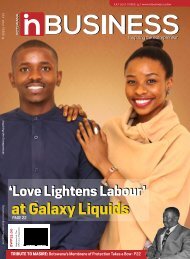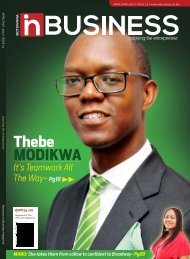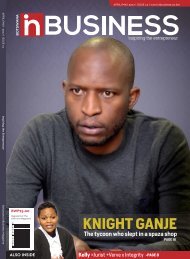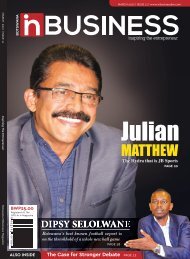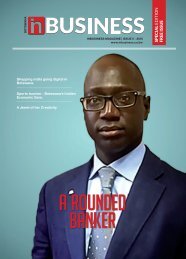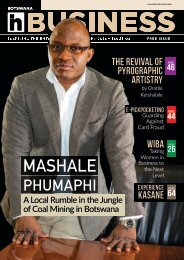inBUSINESS Issue 15
You also want an ePaper? Increase the reach of your titles
YUMPU automatically turns print PDFs into web optimized ePapers that Google loves.
Mlangeni, in 1991 in Soweto.<br />
Thus can it be said that by choosing<br />
the park named after Sophiatown of old<br />
for this year’s Orphans and Vulnerable<br />
Children’s Party, THC Foundation was<br />
making a symbolic connection with<br />
history and hope for the future of the<br />
children it entertained on its founder’s<br />
birthday. Here is Gabs’ own township of<br />
feats of enterprise in the midst of what<br />
is quite a bleak province of poverty,<br />
shining forth as beacons of hope for<br />
the future of its children. Among them<br />
are human rights lawyer Dick Bayford,<br />
Kenneth Koma of the BNF, South African<br />
saxophonist Steve Dyer, the BNF’s<br />
Frank Marumo and that football fanatic<br />
of a lawyer, Tebogo Sebego.<br />
The township of stylish ‘clevers’ like<br />
Gregory was also the birthplace of The<br />
Scaras (sp) band among whose players<br />
were guitarist Wonder Suping, drummer<br />
Sello Bogatsu, bassist Elvis Mphaere<br />
and rhythm guitarist White Kgopo, all<br />
of whom regularly met at a intriguinglynamed<br />
house for practice before<br />
wooing weekend crowds alongside that<br />
outstanding woman on piano, Dineo, at<br />
the Town Hall, Ngotwane<br />
Club, Bontleng<br />
Community<br />
Centre, and<br />
occasionally<br />
the National<br />
Stadium<br />
or even<br />
Tsholetsa<br />
House.<br />
Trumpeter, composer and singer,<br />
Sensei Socca Sello Alexander<br />
Moruakgomo, who lived at Extension<br />
2, remembers often walking through<br />
‘Los My Cherry’ (White City) and across<br />
Independence Avenue to watch, hear<br />
and admire the band in practice at<br />
‘Hector Pore,’ as the house where<br />
The Scaras were based was called,<br />
and is thankful to Gale Letsatsi for<br />
putting together “such an inspirational<br />
ensemble”. After two years of guesting<br />
in and out as lead singer for another<br />
Bontleng band, Mother, Socca would<br />
be confirmed in the position in 1977<br />
following sitting his JC exams at<br />
Mahalapye Secondary School the year<br />
before.<br />
Socialite Noni Pilane – who was<br />
known as much for her beauty and<br />
sartorial statements as she was for<br />
her “Saturday Morning Sounds” soul<br />
music programme on Radio Botswana<br />
at a time when RB had considerable<br />
following in Soweto and beyond - lived<br />
here too. So too did guitarist Chris<br />
Malwetse Lefatshe, bassist Madolo<br />
‘Dollar Brand’ Paledi and Malombo<br />
Mmereki, all three of whom at one<br />
stage ‘disbanded’ from Moloise’s The<br />
Originals to form Imagine where<br />
singing soul man, Tsilo Baitsile,<br />
first came to prominence<br />
under Dennis Alexander’s<br />
management.<br />
But if the Scaras’ Dineo was<br />
nimblefingered<br />
on the piano, Thelma Segola’s style<br />
was nifty and experimental right there<br />
on stage. Both women had a touch and<br />
go disposition that was at once risky<br />
and refreshing as it courted discord<br />
while prodding the rest of the band to<br />
flow together in a rhythmic euphony<br />
that pleased the audience. Debate that<br />
followed their shows was invariably<br />
marked by a see-saw observation that<br />
often led fans to conclude that both<br />
Dineo and Thelma had an equal amount<br />
of the piano passion.<br />
Led by guitarist Selby Ntuli, Thelma’s<br />
Harari – formerly The Beaters - was<br />
a star-studded combo that included<br />
Sipho ‘Hotstix’ Mabuse (drums), Alec<br />
Khaoli (bass), Monty ‘Saitana’ Ndimande<br />
(guitar), Barney Rachabane, Lionel<br />
Petersen, Condry Siqudu and Sello<br />
‘Chicco’ Twala. They were a regular<br />
feature on Gaborone’s music scene<br />
throughout the late-1960s and the ’70s<br />
whose leading lights had residential<br />
addresses at the twilight township of<br />
Bontleng.<br />
So too was Ricky Molefe’s rather<br />
unconventionally-named band, Every<br />
Mother’s Son, and The Minerals of Kori<br />
Moraba fame before Lekofi Sejeso,<br />
Ofentse ‘Bole’ Moagi and Banjo Mosele<br />
made a dramatic, though evanescent,<br />
exclamation mark on the tableau<br />
with The Incrowds in the mid-1970s.<br />
This was at least a decade before<br />
Banjo would tour the world with Hugh<br />
52<br />
www.inbusiness.co.bw | <strong>Issue</strong> <strong>15</strong> | 2017


